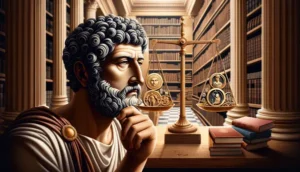Table of Contents
Overview
Stoicism is a philosophical doctrine that originated in the Hellenistic period, emphasizing rationality and self-control as the path to achieving emotional well-being and moral virtue. This philosophy teaches that the development of self-control and fortitude as a means to overcome destructive emotions involves understanding the natural order of the world, particularly the acceptance of one’s fate as determined by reason.
Main Tenets of Stoicism
The core tenets of Stoicism revolve around the idea that the universe is organized through reason and that humans, as rational beings, should align their lives accordingly. This philosophy asserts that virtue, the highest good, is based on knowledge and wisdom, while the pursuit of virtue alone guarantees happiness. Stoics strive to maintain a will that is in harmony with nature, leading to a state of apatheia (a freedom from passion through the use of reason) and achieving tranquility
The Stoic Philosophers
Stoicism was founded by Zeno of Citium in the early 3rd century BCE, and it subsequently developed through the ideas of philosophers like Seneca, Epictetus, and Marcus Aurelius. These figures exemplify the range of social statuses Stoics could occupy—from a slave (Epictetus) to a Roman emperor (Marcus Aurelius), highlighting the universal applicability of Stoic principles regardless of one’s external circumstances.
Modern Stoicism
In contemporary times, Stoicism has seen a revival, often termed “Modern Stoicism,” which adapts ancient teachings for today’s challenges. It emphasizes resilience, rationality, and the importance of emotional regulation in facing the vicissitudes of modern life. This modern interpretation integrates Stoic philosophy with psychological techniques to help individuals deal with stress, develop personal ethics, and improve their overall quality of life.
Conclusion
Stoicism offers timeless wisdom that transcends its ancient origins, providing practical strategies for fostering resilience and happiness through the pursuit of virtue and reason. Its principles continue to resonate in modern philosophical discussions and personal development strategies, proving its enduring relevance and appeal.




